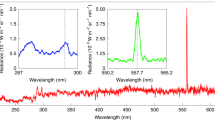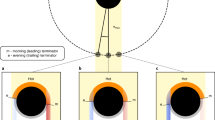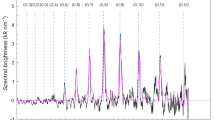Abstract
SINCE the detection of HNO3 in the atmosphere1, it has been expected that oxides of nitrogen, such as NO2, should also be present. In fact, in a previous paper by some of us1 a tentative identification of NO2 absorption was made. The most intense vibration–rotation band of NO2 is the ν3 fundamental, centred at 1,618 cm−1, near the centre of the ν2 H2O band.
This is a preview of subscription content, access via your institution
Access options
Subscribe to this journal
Receive 51 print issues and online access
$199.00 per year
only $3.90 per issue
Buy this article
- Purchase on Springer Link
- Instant access to full article PDF
Prices may be subject to local taxes which are calculated during checkout
Similar content being viewed by others
References
Murcray, D. G., Kyle, T. G., Murcray, F. H., and Williams, W. J., Nature, 218, 78 (1968).
Murcray, D. G., Murcray, F. H., Williams, W. J., Kyle, T. G., and Goldman, A., Appl. Opt. (in the press).
Arakawa, E. T., and Nielsen, A. H., J. Mol. Spectr., 2, 413 (1958).
Author information
Authors and Affiliations
Rights and permissions
About this article
Cite this article
GOLDMAN, A., MURCRAY, D., MURCRAY, F. et al. Identification of the ν3 NO2 Band in the Solar Spectrum observed from a Balloon Borne Spectrometer. Nature 225, 443–444 (1970). https://doi.org/10.1038/225443a0
Received:
Issue Date:
DOI: https://doi.org/10.1038/225443a0
This article is cited by
-
Detection of Nitric Oxide in the Lower Atmosphere
Nature Physical Science (1973)
-
Stratospheric methane and nitrogen dioxide from infrared spectra
Pure and Applied Geophysics (1973)
-
Stratospheric Nitrogen Dioxide from Infrared Absorption Spectra
Nature (1972)
Comments
By submitting a comment you agree to abide by our Terms and Community Guidelines. If you find something abusive or that does not comply with our terms or guidelines please flag it as inappropriate.



